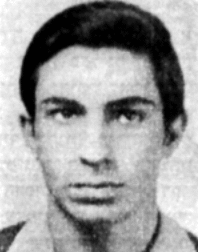 The son of Betty and David, Philip Balkin was born on 2nd February, 1929, in Brooklyn, New York. His parents had immigrated to the US from Lithuania. In 1935 the family moved to Los Angeles, where his father, a leather-worker from his youth, worked in a shoe factory. Philip, an easy-going boy, experienced the flavor of the war of survival. At the age of nine he helped his father to balance the family’s budget by polishing shoes and selling newspapers. His parents tried to give him an active Jewish education. After his regular school hours and after high school, he studied at a Jewish night school in the framework of the Hapoalim organization, of which his father was a member. Philip – enthusiastic and mischievous – didn’t revel in his educational studies. His energies were devoted to sport and to singing in various choirs; he also developed a talent for theatrical drama. When he reached his Jewish high school, he took an interest in the courageous birth of the State of Israel, while previously he had experienced anti-Semitism. He had slapped the face of one of his teachers who had called him “a dirty Jew.”
The son of Betty and David, Philip Balkin was born on 2nd February, 1929, in Brooklyn, New York. His parents had immigrated to the US from Lithuania. In 1935 the family moved to Los Angeles, where his father, a leather-worker from his youth, worked in a shoe factory. Philip, an easy-going boy, experienced the flavor of the war of survival. At the age of nine he helped his father to balance the family’s budget by polishing shoes and selling newspapers. His parents tried to give him an active Jewish education. After his regular school hours and after high school, he studied at a Jewish night school in the framework of the Hapoalim organization, of which his father was a member. Philip – enthusiastic and mischievous – didn’t revel in his educational studies. His energies were devoted to sport and to singing in various choirs; he also developed a talent for theatrical drama. When he reached his Jewish high school, he took an interest in the courageous birth of the State of Israel, while previously he had experienced anti-Semitism. He had slapped the face of one of his teachers who had called him “a dirty Jew.”
In 1946 he was recruited into the U.S. Army and served for more than a year in Korea. Philip did not have an innate interest in military life, but his service in the American army strengthened his anti-military opinions. Despite this, when the news about Israel’s War of Independence reached the U.S.A., he immediately felt that his place was with the fighters for this cause. He was convinced that the fate of the Jews in the U.S. would be no different to what the Jews in Europe had suffered. “It is more likely that the destruction will come about in America by more advanced methods, and will be much worse,” Philip claimed in disputes with his friends. He decided to follow his older brother Jerry and volunteer for the Haganah. He kept his decision secret, and only the night before he was due to leave, in October 1948, did he inform his parents of his plans. He traveled to France under a pseudonym, and from there he came to Israel.
Immediately on arrival he volunteered for the IDF and joined the 89th Commando Battalion of the 8th Armored Brigade. He participated in “Operation Horev” which expelled the Egyptian forces from the Negev. He fell in the attack on Auja-el-Hafir (Nitzana) on 27th December, 1948, and was buried at Chalutza.
On 20th July, 1949, his remains were re-interred in the military cemetery at Nachlat Yitzhak in Tel Aviv.
Translated from the Yizkor website

